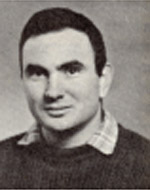Son of Yehuda and Tamar. Born in Tel Aviv on October 2, 1935. His parents were born in Israel and their parents came to Israel from Russia in 1880 to settle in the homeland, and they settled in the town of Mazkeret Batya, also called Ekron. “And when the town was surrounded almost nightly by the rioters and the connection to security was nurtured as it grew, and his parents educated him in the pioneering spirit and the earthwork, first attending elementary school and continuing in a vocational school in Tel Aviv. At the ORT vocational school in Rehovot, and as a member of the “Scouts” and “Young Maccabi.” Meanwhile, when he was 12-13 years old, the War of Independence broke out, in which he was active It should be noted that when he arrived at the mitzva, his parents did not celebrate the event, but wrote his name in the Golden Book of the Jewish National Fund and donated a considerable sum to the Magen David Adom. His personal qualities, which made him an exemplary figure among his comrades in the army, stood out from childhood, and he was ready to lend a helping hand when necessary, and this willingness was inherent in his blood and his faithful friend stood up to him Even in various tests in his life, such as a test of fire and battle. His friends noted that it was good to be with a faithful friend whom you could always trust and whose hearts would be delighted when they knew that a friend like Yoav was inside them. By nature, he was modest, and a worn-out daughter always floated on his face. Even in relation to his family, the specialness of his family is evident – the devotion and love of a loyal son who would have been especially evident in his haste home even when he was away from him for a short time. When he enlisted in the IDF in October 1953, he was put into a transport company that he did not like, because he was drawn to a paratroop unit that was in its early days and whose members were chosen with great care. And his life was paved with a strong desire to embrace wide horizons and always set himself endless challenges, but when he felt that he could not challenge one, he set himself another challenge and sought to achieve it – And as he always did in his army, his career in the army was a wonderful background for Lahav His personal virtues – first as a soldier and then as commander – that this unit demanded courage and willingness to sacrifice, and it was very much in line with Yoav, a brave man who strove for the sacred goal of our people. Before the Sinai Campaign, he participated as a platoon commander in all the retaliation operations and at the outbreak of the Sinai Campaign, he fell in Mitla as a company commander, after which Yoav was appointed to the permanent army, and for a number of years he sought “something new” Pleasure and satisfaction even though he had learned a lot in those days. From time to time he would come up with ideas and plans, and every problem and idea he would provoke would weigh and analyze. After leaving the army he moved to serve as the manager of the national park in Ramat Gan, and after a while left this position, which did not appeal to him, and on the first occasion left Habash with a delegation from Tel Aviv University. From his childhood, he had the opportunity to return to Cyprus as a courier for the Foreign Ministry, where he spent about a year, his letters from Ethiopia and Cyprus were full of landscape descriptions and formal observation of the various forms of life of the inhabitants of these countries, He went through several courses and began to guide them. Then he took a command and headquarters course, In which he excelled very much, but the military life attracted him and the parachute appealed to him; Then he went back to them and his head and most of their problems – and even he could, and reached the rank of major. But his rapid rise in the ranks did not make him feel superior, because he simply and humbly walked among his subordinates, taking part in their many bold actions, and in most of them he took the lead in his men. Which they had for example. In his last action, the retaliatory action, on the first day of March 13, 1966, he marched in his battalion’s head to attack the village of Samua (Ishtamua) in the southern Hebron hills, and fought and fell and was brought to eternal rest in the graveyard In Mazkeret Batya (Ekron) he left a wife, a son and a daughter, and after he fell he was awarded the rank of lieutenant colonel, and his memory was mentioned in Uri Milstein’s book “The Paratroop Wars.”
